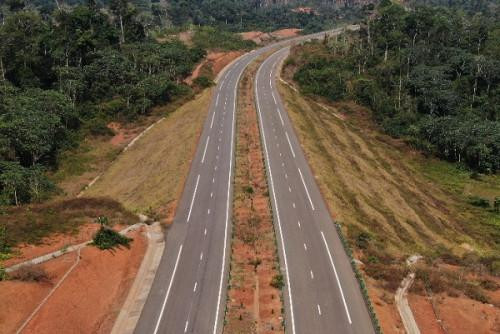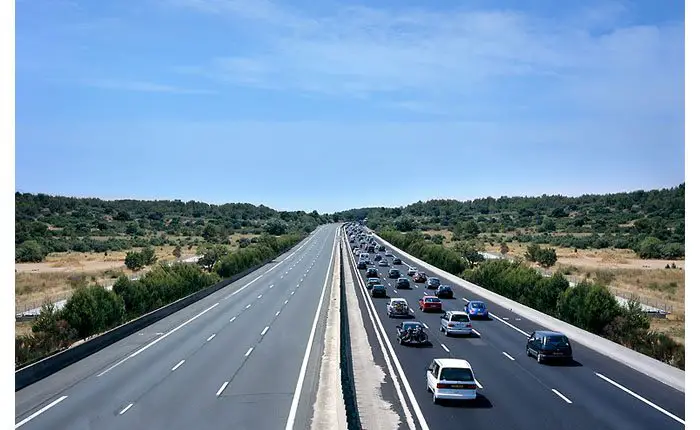After years of delays, Cameroon finally opened the Yaoundé-Douala highway’s first 60 kilometers in January 2022. The 196 km long modern road network will link the two main cities in the nation. Its initial phase of construction is anticipated to cost XAF338.7 billion VAT.
The Yaoundé-Douala motorway will ultimately cost 11 million USD per kilometer according to a report by the international financial institution published in 2018. The project’s second phase is now in the limited bidding stage. The Ministry of Public Works of Cameroon recently announced that the Yaoundé-Douala Expressway Phase II project has a total construction mileage of 136 kilometers and a total cost of about 812.8 billion CFA francs (before tax).
Reported in September 2014
US-based Louis Berger to construct a US$ 9.0m section of the Yaoundé-Douala highway in Cameroon
Louis Berger, an engineering services company based in the US has secured a five-year contract for construction works to improve a section of the Yaoundé-Douala highway in Cameroon. The contract is a five-year engagement that will see the country’s Yaoundé diplomatic region connected to the country’s Douala deepwater port.
Construction works on the Yaoundé-Douala highway by Louis Berger will make the road a straighter and safer two-lane motorway. The highway is a busy one, attracting truck traffic, and is characterized by poor maintenance and many curves, according to the company. Indeed, Louis Berger has characterized it as one of the deadliest in the Central African region.
“The new 236km highway will lead to reduced travel time and will hopefully have a positive impact on international transportation because Cameroon is a key transit country for the landlocked countries of Central Africa.” Said the company’s head of Africa operations, Jean-Pierre Dupacq.
March 2019
Construction of Yaounde-Douala Expressway in Cameroon advances
Construction works on the Yaounde-Douala expressway in Cameroon are advancing, with the road stretching wider. This is according to the Ministry of Public Works shows.
The Ministry explained that the first 30km of the road from Yaounde has been completely tarred while PK30-PK40 is 90% paved and the PK40-PK60 stretch freed by locals. The government has also cleared the required compensation to the beneficiaries who contributed to stalling of the project on many occasions.
Yaounde-Douala expressway project
The Yaounde-Douala expressway project involved works construction of a new highway on a new route, while conserving the current national highway 3. The road links the economic capital Douala to the political capital Yaounde.
The remaining bits in phase one include clearing, grading, and terracing. The project contractor China First Highway Engineering Company (CFHEC) said that efforts are being stepped up to get the first phase of the road which is 60km completed soon.
The road project aims at easing traffic on National Road No. 3 which has so far been impeded by the conditions of calculability of the heavy traffic between the two major Cameroonian cities.
The Douala Yaoundé Bafoussam Douala highway loop is also expected to reduce the number of accidents on this road considered one of the most deadly of the continent, and ensure a steady flow of goods between the three biggest Cameroonian cities, which constitute hubs for many crops and products.
Phase two of the project will include the construction of a connecting flyover at Bibodi to connect the expressway to National Road No. 3. The blueprint of the second phase of is already available and Cameroon is in search of a partner to finance the construction of a public-private partnership basis.
April 2021
Yaound-Douala road project phase 1 to be commissioned in Jan 2022
The first phase of the Yaoundé-Douala Road project in Cameroon is expected to be commissioned by January 2022 at the latest according to Benoît Parfait Mbole Mbole, the Head of the Infrastructures Department of the Central African country’s Ministry of Public Works.
Mr. Mbole made the revelation during his site visit to assess the works on this section of the project which according to the control mission made up of Scet-Tunisie (a development consulting firm), and Louis-Berger, (full-service engineering, architecture, planning, environmental, program, and construction management, and economic development firm), is 98% completed.
Start of implementation of this project
Works in the framework of the first phase of the 196-km Yaoundé-Douala highway infrastructure started in October 2014 with its completion set for 48 months. However, the deadlines were first extended by 12 months from October 2018 to October 2018 and again by 14.5 months from October 2019 to December 2020, and now from December 2020 to October 2021.
According to the project contractor, China First Highway Engineering, the latest delay was mainly a result of delays in the clearance of rights-of-ways for the project and bill payments and partly due to the Covid-19 pandemic, the difficulties encountered during the demolition of rocky masses along the KP 40 and KP 60 and during the construction of earthworks on this same route.
Scope of the project
The project mainly involves the construction of a 60-kilometer 2 x 2-lane freeway, extendable to 3 lanes, from kilometer point 0 to the Bibodi interchange. It also involves the construction of two access roads over a 25-route.
The first access road is a 10-km (2 X 2 lanes) structure through which users can reach KP 00 of the highway from the central post office located at the center of Yaoundé, while the second one will be 13 km long from Bibodi (KP 60) to National Road No. 3 at Boumnyebel.
Other works include the building of functional infrastructure such as tolls, weighing stations, rest and service areas as well as emergency lanes.
July 2021
Yaound-Douala highway phase 1 construction in Cameroon is 98% complete
The ongoing construction works of the first phase of the Yaoundé-Douala highway in Cameroon have been reported to be 98 percent complete following an assessment and evaluation of the site by Emmanuel Nganou Djoumessi the West African country’s Minister of Public Works.
According to Hermi Tarek, the Head of the Scet Tunisia / Louis Berger Control Mission in charge of monitoring this work at this stage, only the completion of the wearing course on the last ten kilometers of the phase remains, and considering the current rate of implementation of the wearing course i.e. one kilometer per day for a platform width of 11 meters each, the wearing course should be complete within ten to fifteen days.
“Also the construction of the pavement layer, the sewerage networks, the safety system, and the bridge structure on the Manyai River is also underway. Generally, we hope to open the highway and offer it to the people of Cameroon before the end of December this year (2021).
A recap of the Yaoundé-Douala highway project
The Yaoundé-Douala highway project entails the construction of 196 kilometers of road. It is divided into two phases, the first of which concerns the Yaoundé-Bibodi section over a 60 km stretch, with 25 km of connecting roads to National Road No. 3.
Phase 2 covers the Bibodi-Douala route over a length of 136 km and it is currently in the tendering process, particularly, the review of restricted tender documents by the Ministry of Public Works. The tender process was launched on December 22, 2020.
Ultimately, the Yaoundé-Douala highway project aims to build a 2 × 2 lane type infrastructure extending to 2 × 3 lanes on a platform 33.5 meters wide with emergency lanes of 3 meters each.
May 2022
Cameroon to Raise CFA 1,264 to Construct Yaounde Ring Road
Cameroon intends to obtain CFA 1,264 billion from investors to construct the Yaounde ring road and develop the four urban hubs linked to it, according to Minister of the Economy Alamine Ousmane Mey.
Of the total amount, CFA794 billion will be spent on the bypass and CFA88 billion on compensation and population displacement, CFA470 billion on the development of the capital’s four urban hubs, and CFA20 billion on compensation and relocation.
The Yaounde ring road project is one of the top goals in the Central African region’s EU-backed transport development plan. It was chosen as one of the projects that could benefit from blending financing on January 20, 2022, during the presentation of the report of the EU-commissioned technical assistance mission to the CEMAC and ECCAS nations in a bid to identify regional and national infrastructure projects that may benefit from this funding.
Scope of the Yaounde ring road project
Committed to the Cowi and Ecorys consortium, the Yaounde ring road project, according to the technical assistance mission, comprises the construction of over 44 kilometers of road that will boost the flow of trade between Cameroon, the Central African Republic (CAR), and Chad.
Through this road, vehicles driving along the Douala-Ndjamena and Douala-Bangui corridors will be able to avoid traffic jams and other inconveniences when traversing downtown Yaounde. Studies have already been completed for this road, according to the documentation of the aforementioned technical assistance mission, and CFA495 billion finance in blending mode is being raised at the moment.
In-depth technical studies carried out by the consultancy firm Cira-Sas between 2019 and 2021, show that only phase 1 of the entire Yaounde ring road project has been identified for this financing approach. This phase covers the 32-kilometer Nkong Biyem (RN3)-Nkoabang (RN10) section and the 10.3-kilometer Minkoameyos (Yaoundé-Douala highway)-Nkong Biyem (RN3) section.
The complete technical studies for this phase are being carried out, according to the TED platform, the supplement to the EU official journal.

